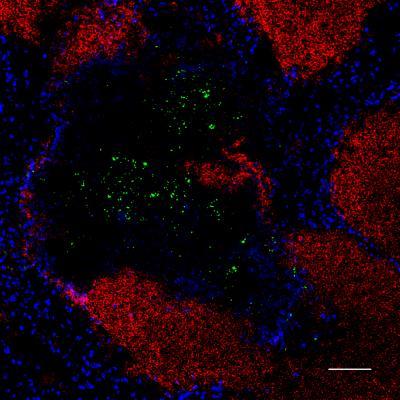
Credit: CDC
Listeria is a dreaded bacterium that can be found in foods. The bacterium is notoriously difficult to fight because it has an almost uncanny ability to adapt to changes in its surrounding. In the United States, it is more prevalent in products like raw milk, foods that have not been washed, like organic produce, and improperly handled meat.
Yet in other countries it is broader. Recently in Denmark, 28 people got Listeria from processed food sold in supermarkets. 13 died. More commonly something like canned tuna stored in a refrigerator is safer than unprocessed tuna.
University of Southern Denmark Associate Professor Birgitte Kallipolitis and colleagues have published a study, which in details reveals how Listeria's extreme ability to adapt takes place. The researchers tested how Listeria reacts when it is exposed to a number of substances that can normally fight pathogenic bacteria. In the laboratory, Listeria was exposed to antibiotics, bile, salt, acid and ethanol, similar to what it often encounters in food, in the human body and during disinfection.

When infected with Listeria monocytogenes (green) it is important to have the right immune cells present at the right time. Too many natural killer cells for example can block the recruitment of neutrophilic granulocytes (red) which are vital for the immune response. Credit: © HZI / Jablonska
The researchers discovered that Listeria used a variety of strategies that enabled them to withstand the substances.
"Generally speaking, Listeria must be described as extremely adaptable. It is constantly aware of its surroundings and if the environment changes around it. It reacts instantly and has a number of strategies to withstand threats", says Birgitte Kallipolitis.
The researchers also discovered that Listeria is an expert at not attracting unwanted attention from the body's immune system.
"On the one hand, Listeria needs to produce some special proteins that enable it to infect the cells in our body. On the other hand, it must ensure that the body's immune system does not detect these proteins. It is vital for Listeria to keep a balance between producing enough of these proteins but not so many that they are detected by the immune system – and it masters just that", explains Birgitte Kallipolitis.
When in the lab, the researchers looked at what happened at the microbiological level. It turned out that Listeria started producing some special RNA molecules, when they were exposed to antibiotics, bile, salt, acid and ethanol.
"With these RNA molecules the bacteria can adjust how much or how little to produce of various proteins. For example it can downgrade the production of the protein LapB, which it uses to enter our cells. If this production is not downgraded, the bacterium will potentially be detected and fought by the immune system", says Birgitte Kallipolitis.
In other words: Listeria can fine-tune the production of the proteins needed to infect our cells to a point where there is exactly enough to sneak through the immune system's defense, but not so many that they are discovered.
The RNA molecules, produced when Listeria face dangerous environmental changes, also helps Listeria monitor its own cell wall. Antibiotics work by attacking the bacterial cell wall, and when exposed to antibiotics Listeria immediately detects that its cell wall is attacked. This enables it to quickly repair its cell wall - and thus become ready for combat again.
"We see this production of RNA molecules only when Listeria is exposed to threatening substances in the lab. When there are no threats, Listeria does not produce them. This reveals part of the mechanism behind Listeria´s extreme adaptability", concludes Birgitte Kallipolitis.
The understanding of how Listeria is able to survive antibiotics, the immune system and disinfecting agents is necessary in order to develop effective means against the life-threatening bacteria.
"Only by looking at what the bacteria themselves do to survive, we can become better at fighting their pathogenicity", says Birgitte Kallipolitis.
She and her colleagues are now investigating whether Listeria can be changed into harmless bacteria by removing the RNA molecules.





Comments